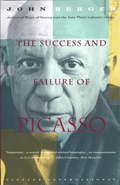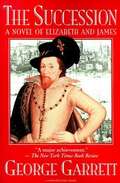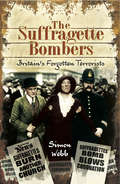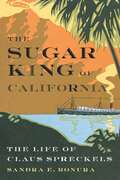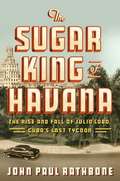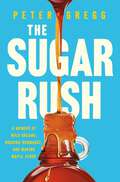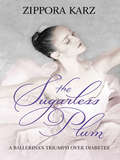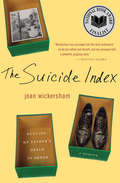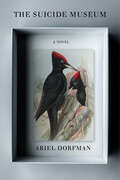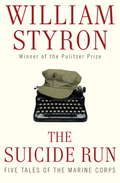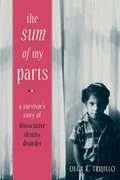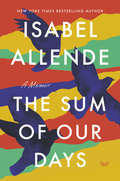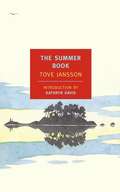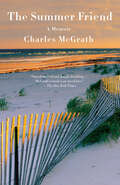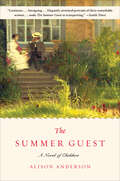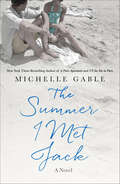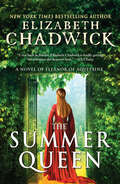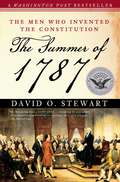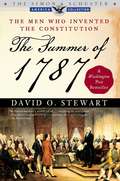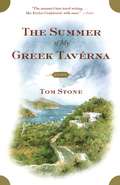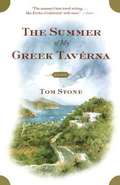- Table View
- List View
The Success and Failure of Picasso (Vintage International)
by John BergerAt the height of his powers, Pablo Picasso was the artist as revolutionary, breaking through the niceties of form in order to mount a direct challenge to the values of his time. At the height of his fame, he was the artist as royalty: incalculably wealthy, universally idolized--and wholly isolated. In this stunning critical assessment, John Berger--one of this century's most insightful cultural historians--trains his penetrating gaze upon this most prodigious and enigmatic painter and on the Spanish landscape and very particular culture that shpaed his life and work. Writing with a novelist's sensuous evocation of character and detail, and drawing on an erudition that embraces history, politics, and art, Berger follows Picasso from his childhood in Malaga to the Blue Period and Cubism, from the creation of Guernica to the pained etchings of his final years. He gives us the full measure of Picasso's triumphs and an unsparing reckoning of their cost--in exile, in loneliness, and in a desolation that drove him, in his last works, into an old man's furious and desperate frenzy at the beauty of what he could no longer create.
The Succession: A Novel of Elizabeth and James
by George GarrettA story inspired by the actual letters of Queen Elizabeth to James VI of Scotland with splendid characters some of them "real" (Sir Robert Cecil, Sir Robert Carey, the Earl of Essex) and some of them "imaginary" --a messenger, a priest, a player, some Scots reivers, etc.
The Suffragette Bombers: Britain's Forgotten Terrorists
by Simon WebbIn the years leading up to the First World War, the United Kingdom was subjected to a ferocious campaign of bombing and arson. Those conducting this terrorist offensive were members of the Women's Social and Political Union; better known as the suffragettes. The targets for their attacks ranged from St Paul's Cathedral and the Bank of England in London to theatres and churches in Ireland. The violence, which included several attempted assassinations, culminated in June 1914 with an explosion in Westminster Abbey.Simon Webb explores the way in which the suffragette bombers have been airbrushed from history, leaving us with a distorted view of the struggle for female suffrage. Not only were the suffragettes far more aggressive than is generally known, but there exists the very real and surprising possibility that their militant activities actually delayed, rather than hastened, the granting of the parliamentary vote to British women.
The Sugar King of California: The Life of Claus Spreckels
by Dr. Sandra E. BonuraClaus Spreckels (1828–1908) emigrated from his homeland of Germany to the United States with only seventy-five cents in his pocket, built a sugar empire, and became one of the richest Americans in history alongside John D. Rockefeller, Warren Buffett, and Bill Gates. Migrating to San Francisco after the gold rush, Spreckels built the largest sugar beet factory of its kind in the United States. His sugar beet production in the Salinas Valley changed the focus of valley agriculture from dry to irrigated crops, resulting in the vast modern agricultural-industrial economy in today&’s &“Salad Bowl of the World.&” When Spreckels gave America its first sugar cube, he became the &“Sugar King.&” The indomitable Spreckels was a colorful and complicated character on both sides of the Pacific. A kingpin in the development of the Hawai&‘i-California sugarcane industry, he wielded a clenched fist over Hawai&‘i&’s economy for nearly two decades after occupying a position of unrivaled power and political influence with the Hawaiian monarchy, while also advancing major technology developments on the islands. The Sugar King&’s legacy continued as the Spreckels family developed large portions of California, building and breaking monopolies in agriculture, shipping, railroading, finance, real estate, horse breeding, utilities, streetcars, and water infrastructure, and building entire towns and cities from infrastructure to superstructure. In The Sugar King of California Sandra E. Bonura tells the rags-to-riches story of Spreckels&’s role in the developments of the sugarcane industry in the American West and across the Pacific, triumphing in a milieu rife with cronyism and corruption and ultimately transforming California&’s industry and labor. Harshly criticized by his enemies for ruthless business tactics but loved by his employees, he was unapologetic in his quest for wealth, asserting &“Spreckels&’s success is California&’s success.&” But there&’s always a cost for single-minded determination; the legendary family quarrels even included a murder charge. Spreckels&’s biography is one of business triumph and tragedy, a portrait of a family torn apart by money, jealousy, and ego.
The Sugar King of Havana
by John Paul RathboneThe son of a Cuban exile recounts the remarkable and contradictory life of famed sugar baron Julio Lobo, the richest man in prerevolutionary Cuba and the last of the island's haute bourgeoisie. Fifty years after the Cuban revolution, the legendary wealth of the sugar magnate Julio Lobo remains emblematic of a certain way of life that came to an abrupt end when Fidel Castro marched into Havana. Known in his day as the King of Sugar, Lobo was for decades the most powerful force in the world sugar market, controlling vast swathes of the island's sugar interests. Born in 1898, the year of Cuba's independence, Lobo's extraordinary life mirrors, in almost lurid technicolor, the many rises and final fall of the troubled Cuban republic. The details of Lobo's life are fit for Hollywood. He twice cornered the international sugar market and had the largest collection of Napoleonica outside of France, including the emperor's back teeth and death mask. He once faced a firing squad only to be pardoned at the last moment, and later survived a gangland shooting. He courted movie stars from Bette Davis to Joan Fontaine and filled the swimming pool at his sprawling estate with perfume when Esther Williams came to visit. As Rathbone observes, such are the legends of which revolutions are made, and later justified. But Lobo was also a progressive and a philanthropist, and his genius was so widely acknowledged that Che Guevara personally offered him the position of minister of sugar in the Communist regime. When Lobo declined-knowing that their worldviews could never be compatible-his properties were nationalized, most of his fortune vanished overnight, and he left the island, never to return to his beloved Cuba. Financial Times journalist John Paul Rathbone has been fascinated by this intoxicating, whirligig, and contradictory prerevolutionary period his entire life. His mother was also a member of Havana's storied haute bourgeoisie and a friend of Lobo's daughters. Woven into Lobo's tale is her family's experience of republic, revolution, and exile, as well as the author's own struggle to come to grips with Cuba's, and his family's, turbulent history. Prodigiously researched and imaginatively written, The Sugar King of Havana is a captivating portrait of the glittering end of an era, but also of a more hopeful Cuban past, one that might even provide a window into the island's future. .
The Sugar Rush: A Memoir of Wild Dreams, Budding Bromance, and Making Maple Syrup
by Peter GreggFilled with humor and madcap adventure, The Sugar Rush is the story of two friends with a sweet, golden, syrupy dream, set against the rugged New England wilderness.Trying to shake off the emotions of a recently emptied nest and midlife anxiety, Peter Gregg launches into a strange new chapter—he decides to make maple syrup. A lot of it. After recruiting his best buddy, Bert, and collecting advice from a clique of salty farmers who&’ve been sugaring all their lives, Gregg is soon consumed by what maple producers call &“the Bug.&” He sets out to chase the mythical &“five pounder&” goal—a lofty syrup production total that&’ll put him in league with the pros in Vermont. For the next three months, from January to early April, the two men battle the rugged terrain of a mountain of maples in an Ahab-like quest that eats up their energy, time, and contents of their wallets. Along the way, they learn how to handle dangerous equipment, outrun predatory wildlife and deal with the sped-up seasons brought on by climate change. Out of their struggle, they get something more valuable than the liquid gold they&’re cooking: bonds of lasting friendship, a lifeline to a community, and a sense of purpose that remains long after sugaring season is over. At its heart, The Sugar Rush is a deliciously hilarious yet moving account of the crazy journey some people will take in their "pursuit of happiness." Told with humor, gusto, and in the profane vernacular common to the woodsy hinterlands of Upstate New York and Vermont, The Sugar Rush speaks to a desire to set the bar high... and the pancake stack higher.
The Sugarless Plum
by Zippora KarzIt started as the perfect story. Zippora Karz was a member of the famed New York City Ballet by the age of eighteen. By twenty she was starring in The Nutcracker and traveling the world. It was the stuff dreams are made of until, at twenty-one, Karz became exhausted, dizzy and excessively thirsty. Heavy makeup covered sores under her arms that would not heal. When she finally went to the doctor, she was diagnosed with diabetes. Once placed on insulin to regulate her blood sugar, she would inject herself with unsafe doses before going on stage in attempts to obtain peak performance. . . with potentially fatal results. Balancing ballet and blood sugar would be a long and difficult struggle for Karz, but eventually she learned to value her body and work with it, rather than rage at its limitations. In The Sugarless Plum, Karz shares her journey from denial, shame and miseducation about her illness to how she led an active, balanced and satisfying life.
The Suicide Index: Putting My Father's Death in Order
by Joan WickershamNational Book Award Finalist: &“Wickersham has journeyed into the dark underworld inside her father and herself and emerged with a powerful, gripping story.&” —The Boston Globe One winter morning in 1991, Joan Wickersham&’s father shot himself in the head. The father she loved would never have killed himself, and yet he had. His death made a mystery of his entire life. Who was he? Why did he do it? And what was the impact of his death on the people who loved him? Using an index—the most formal and orderly of structures—Wickersham explores this chaotic and incomprehensible reality. Every bit of family history, every encounter with friends, doctors, and other survivors, exposes another facet of elusive truth. Dark, funny, sad, and gripping, at once a philosophical and a deeply personal exploration, The Suicide Index is, finally, a daughter&’s anguished, loving elegy to her father.
The Suicide Museum: A Novel
by Ariel DorfmanA billionaire Holocaust survivor hires a writer to uncover the truth of Salvador Allende&’s death, and they must confront their own dark histories to find a path forward—for themselves and for our ravaged planet. An expansive, engrossing mystery for fans of Gabriel García Márquez, Margaret Atwood, and Bill McKibben, from the acclaimed author of Death and the Maiden.Ariel needed money, and Joseph Hortha had it. Bound by gratitude toward the late Chilean president and a persistent need to know whether murder or suicide ended his life during the 1973 coup, the two men embark on an investigation that will take them from Washington DC and New York, to Santiago and Valparaíso, and finally to London. They encounter an unforgettable cast of characters: a wedding photographer who can predict a couple&’s future; a policeman in pursuit of the serial killer targeting refugees; a revolutionary caught trying to assassinate a dictator; and, above all, the complex women who support them along the way, for their own obscure reasons. Before Ariel and Joseph can resolve a quest full of dangers and enigmas, they must help each other come to terms with guilt and trauma from personal catastrophes hidden deep in the past. What begins as an intriguing literary caper unfolds into a propulsive, philosophical saga about love, family, machismo, fascism, and exile that asks what we owe the world, one another, and ourselves. By boldly mixing fiction and reality, imagination and history, The Suicide Museum explores the limits of the novelistic genre, expanding it in an unsuspected and exceptional way.
The Suicide Run: Five Tales of the Marine Corps
by William StyronThe four narratives which make up this posthumous collection draw upon William Styron's experiences in the US Marine Corps, and give us an insight into the early life of one of America's greatest modern writers. William Styron earned a commission as second lieutenant in the U.S. Marine Corps in 1945, shortly after his twentieth birthday. He was scheduled to participate in the assault on mainland Japan, most likely as the leader of a mortar platoon, but in early August the United States dropped atomic bombs on Hiroshima and Nagasaki, ending the war. Before he was discharged Styron served a six-week stint as an officer at the military prison on Harts Island in Long Island Sound. In December 1945 he was mustered out of the Marine Corps, and lived with his father and stepmother at their home in Newport News, Virginia, before completing his bachelor degree at Duke University and embarking on his first novel, Lie Down in Darkness. Early in 1951, as he was composing the last two chapters of his manuscript, Styron was recalled into the Marine Corps for service in Korea. The stories of The Suicide Run are set in the grueling camps and sweltering training fields that marked the limbo point between civilian life and the horrors of war. Fictional yet autobiographical, the narratives of this collection focus on young men who, broiling in the claustrophobia of military life, always conscious of the imminence of action, try to maintain their sanity in the wake of their abrupt removal from normal life. In The Suicide Run, two young men at Camp Lejeune, North Carolina embark on suicidal 36 hour leave periods Â- crossing the 500 miles to New York and back at breakneck speed for a few hours with their mistresses and a reprieve from the 'sexual famine' of army life. In Blankenship a young idealist and deserter at a military prison hits a nerve in a model officer, with disastrous consequences for both, and in My Father's House, the young protagonist returns home from war to be met by the cold war of his stepmother's disapproval, and be haunted by all the battles he almost fought. Imbued with a sense of frustration and looming fear, keenly rendered in Styron's pithy and acutely observational prose, this collection is a fascinating insight into military life and the 'mysterious community of men' that comprises the US Marine Corps, and a posthumous glimpse into the mind of a mighty writer.
The Sum Of My Parts: A Survivor's Story Of Dissociative Identity Disorder
by Olga R. TrujilloBy the first day of kindergarten, Olga Trujillo had already survived years of abuse and violent rape at the hands of her tyrannical father. Over the next ten years, she would develop the ability to numb herself to the constant abuse by splitting into distinct mental "parts. " Dissociative identity disorder (DID) had begun to take hold, protecting Olga's mind from the tragic realities of her childhood. InThe Sum of My Parts, Olga reveals her life story for the first time, chronicling her heroic journey from survivor to advocate and her remarkable recovery from DID. Formerly known as multiple personality disorder, DID is defined by the presence of two or more identities. In this riveting story, Olga struggles to unearth memories from her childhood, and parallel identities--Olga at five years old, Olga at thirteen--come forth and demand to be healed. This brave, unforgettable memoir charts the author's triumph over the most devastating conditions and will inspire anyone whose life has been affected by trauma.
The Sum of Our Days: A Memoir (P. S. Ser.)
by Isabel AllendeNarrated with warmth, humor, exceptional candor and wisdom, The Sum of Our Days is a portrait of a contemporary family, tied together by the love, strong will, and stubborn determination of a beloved matriarch, the indomitable New York Times bestselling author of The House of the Spirits, Isabel Allende. "An inspiring and thought-provoking work." –Denver Post Isabel Allende reconstructs the painful reality of her own life in the wake of the tragic death of her daughter, Paula. Narrated with warmth, humor, exceptional candor, and wisdom, this remarkable memoir is as exuberant and as full of life as its creator. Allende bares her soul while sharing her thoughts on love, marriage, motherhood, spirituality and religion, infidelity, addiction, and memory—and recounts stories of the wildly eccentric, strong-minded, and eclectic tribe she gathers around her and lovingly embraces as a new kind of family.
The Summer Book
by Kathryn Davis Tove Jansson Thomas TealIn The Summer Book Tove Jansson distills the essence of the summer--its sunlight and storms--into twenty-two crystalline vignettes. This brief novel tells the story of Sophia, a six-year-old girl awakening to existence, and Sophia's grandmother, nearing the end of hers, as they spend the summer on a tiny unspoiled island in the Gulf of Finland. The grandmother is unsentimental and wise, if a little cranky; Sophia is impetuous and volatile, but she tends to her grandmother with the care of a new parent. Together they amble over coastline and forest in easy companionship, build boats from bark, create a miniature Venice, write a fanciful study of local bugs. They discuss things that matter to young and old alike: life, death, the nature of God and of love. "On an island," thinks the grandmother, "everything is complete." In The Summer Book, Jansson creates her own complete world, full of the varied joys and sorrows of life.Tove Jansson, whose Moomintroll comic strip and books brought her international acclaim, lived for much of her life on an island like the one described in The Summer Book, and the work can be enjoyed as her closely observed journal of the sounds, sights, and feel of a summer spent in intimate contact with the natural world.
The Summer Friend: A Memoir
by Charles McGrathAlive with the intoxicating magic of summer in New England, former editor of the New York Times Book Review Charles McGrath&’s evocative memoir looks back at that sun-soaked season, at family, youth, and a singular bond made at a time when he thought he was beyond making friends. &“To read Chip McGrath&’s gentle, elegant memoir … is to lose yourself in your own past summers, especially the ones of your youth, when you imagined there&’d be an infinite number of them, and also friends to share those summers with. That both turn out to be numbered makes this book positively ache with beauty and loss.&” —Richard RussoIt was early evening and a new acquaintance had come to retrieve his daughter from a play date. Instead of driving up in a minivan, he arrived by water, tacking his sailboat smartly across a squiggly channel in the marsh, throwing a rope overboard, and zipping back home, his gleeful daughter riding in the wake. Who knew you could do such a thing? And how could you resist befriending a man such as that? Over the course of this rich memoir, McGrath recalls with a gimlet eye the pleasures of summers past: amateur lobstering, 9-hole golf, family costume charades, bridge-jumping, and a friendship forged between two men from different backgrounds who came together late in life. Recounting the vagaries of summer with such precision and warmth-- peeling long strips of sunburnt skin from your shoulder as if &“shuffling off your own cocoon,&” the outdoor shower curtain blowing open in the breeze, an M80 firework in the mailbox--The Summer Friend is simultaneously a potent evocation of the rhythms and rituals of summer and a stirring remembrance of a friend found and then lost.
The Summer Guest: A Novel of Chekhov
by Alison AndersonA young Anton Chekhov connects the lives of three women: “An enchanting era-spanning novel [and] a literary mystery that goes beyond the limits of time.” —Entertainment Weekly, “Must List”During the long, hot summer of 1888, an extraordinary friendship blossoms between Anton Chekhov and Zinaida Lintvaryova, a young doctor. Recently blinded by illness, Zinaida has retreated to her family’s estate in the lush countryside of Eastern Ukraine, where she is keeping a diary to record her memories of her earlier life. But when the Chekhov family arrives to spend the summer at a dacha on the estate, and she meets the middle son, Anton Pavlovich, her quiet existence is transformed. What begins as a journal kept simply to pass the time becomes an intimate, introspective narrative of Zinaida’s singular relationship with this fellow doctor and writer of growing fame.Over a century later, in 2014, the diary’s discovery represents Katya Kendall’s last chance to save her struggling London publishing house. Zinaida’s description of a gifted young man still coming to terms with his talent offers profound insight into a literary legend, but also raises a tantalizing question: Did Chekhov, known only as a short story writer and playwright, write a novel over the course of their friendship that has since disappeared? Finding the answer proves an irresistible challenge for Ana Harding, the translator Katya hires. Increasingly drawn into Zinaida and Chekhov’s world, Ana is consumed by a desire to find the “lost” book. As she delves deeper into the moving account of two lives changed by a meeting on a warm May night, she discovers that the manuscript is not the only mystery contained within the diary’s pages.Inspired by the real friendship between Chekhov and the Lintvaryov family, The Summer Guest “explores the intimate relationships of one of Russia’s best loved writers and poses intriguing questions about the fine line between art and deception” (Kathleen Tessaro, New York Times-bestselling author of The Perfume Collector).“Transporting.” —Seattle Times“An exceptional novel about the transcendent possibilities of literature, friendship, and contemplation.” —Kirkus Reviews (starred review)“Elegant. . . . packs a heartbreakingly lovely emotional punch.” —Booklist (starred review)“The Summer Guest gives us all of the pleasures of a superb mystery novel, but most of all it is a profound meditation on the power, and necessity, of the imagination.” —Ron Rash, New York Times-bestselling author of The Caretaker
The Summer I Met Jack: A Novel
by Michelle Gable"[The Summer I Met Jack] offers an alternate Kennedy family history that will leave readers wondering whether America knew the real JFK at all." --Kirkus ReviewsNew York Times bestselling author imagines the affair between John F. Kennedy and Alicia Corning Clark - and the child they may have had.Based on a real story - in 1950, a young, beautiful Polish refugee arrives in Hyannisport, Massachusetts to work as a maid for one of the wealthiest families in America. Alicia is at once dazzled by the large and charismatic family, in particular the oldest son, a rising politician named Jack. Alicia and Jack are soon engaged, but his domineering father forbids the marriage. And so, Alicia trades Hyannisport for Hollywood, and eventually Rome. She dates famous actors and athletes and royalty, including Gary Cooper, Kirk Douglas, and Katharine Hepburn, all the while staying close with Jack. A decade after they meet, on the eve of Jack’s inauguration as the thirty-fifth President of the United States, the two must confront what they mean to each other. The Summer I Met Jack by Michelle Gable is based on the fascinating real life of Alicia Corning Clark, a woman who J. Edgar Hoover insisted was paid by the Kennedys to keep quiet, not only about her romance with Jack Kennedy, but also a baby they may have had together.
The Summer I Met the City (Fountas & Pinnell LLI Gold #Level N)
by Sunita ApteFar from Home. When Sunita spends the summer in Budapest, she makes some important discoveries--and not just about new places and people. What she learns about herself will stay with her forever.
The Summer Queen: A Novel of Eleanor of Aquitaine (Eleanor of Aquitaine #1)
by Elizabeth ChadwickScandal, politics, sex, triumphs, and tragedies abound in The Summer Queen, the first novel in this stunning trilogy, by New York Times bestselling author Elizabeth ChadwickYoung Eleanor has everything to look forward to as the heiress to the wealthy Aquitaine. But when her beloved father suddenly dies, childhood is over. Sent to Paris and forced to marry Prince Louis VII of France, she barely adjusts before another death catapults them to King and Queen.The first in the Eleanor of Aquitaine Trilogy, The Summer Queen follows Eleanor through the Second Crusade to the end of her marriage to Louis VII. Faced with great scandals, trials, fraught relationships, and forbidden love at every turn, Eleanor seeks the path that will make her queen of two countries and one of the most powerful women in the world.Chadwick's meticulous research portrays the Middle Ages and Eleanor with depth and vivid imagery unparalleled in historical fiction that will keep readers riveted and wanting more.Following the legendary life of Eleanor of Aquitaine, 12th Century Queen of France, and later Queen of England, this trilogy is medieval historical fiction at its most romantic, scandalous, and intriguing.The Eleanor of Aquitaine Trilogy: The Summer Queen (Book 1) The Winter Crown (Book 2) The Autumn Throne (Book 3)Praise for The Summer Queen: "A magnificent woman's story told by a brilliant historical novelist; realistic, emotional, vibrant, exciting and unputdownable."—RT Book Reviews, July Top Pick "The Summer Queen is a fabulous novel based on the most up-to-date and meticulous research. This is historical fiction at its best and I loved every page of it."—For Winter Nights: A bookish blog
The Summer of 1787
by David O. StewartThe successful creation of the Constitution is a suspense story. The Summer of 1787 takes us into the sweltering room in which delegates struggled for four months to produce the flawed but enduring document that would define the nation -- then and now. George Washington presided, James Madison kept the notes, Benjamin Franklin offered wisdom and humor at crucial times. The Summer of 1787traces the struggles within the Philadelphia Convention as the delegates hammered out the charter for the world's first constitutional democracy. Relying on the words of the delegates themselves to explore the Convention's sharp conflicts and hard bargaining, David O. Stewart lays out the passions and contradictions of the often painful process of writing the Constitution. It was a desperate balancing act. Revolutionary principles required that the people have power, but could the people be trusted? Would a stronger central government leave room for the states? Would the small states accept a Congress in which seats were alloted according to population rather than to each sovereign state? And what of slavery? The supercharged debates over America's original sin led to the most creative and most disappointing political deals of the Convention. The room was crowded with colorful and passionate characters, some known -- Alexander Hamilton, Gouverneur Morris, Edmund Randolph -- and others largely forgotten. At different points during that sultry summer, more than half of the delegates threatened to walk out, and some actually did, but Washington's quiet leadership and the delegates' inspired compromises held the Convention together. In a country continually arguing over the document's original intent, it is fascinating to watch these powerful characters struggle toward consensus -- often reluctantly -- to write a flawed but living and breathing document that could evolve with the nation.
The Summer of 1787
by David O. StewartThe successful creation of the Constitution is a suspense story. The Summer of 1787 takes us into the sweltering room in which delegates struggled for four months to produce the flawed but enduring document that would define the nation -- then and now. George Washington presided, James Madison kept the notes, Benjamin Franklin offered wisdom and humor at crucial times. The Summer of 1787 traces the struggles within the Philadelphia Convention as the delegates hammered out the charter for the world's first constitutional democracy. Relying on the words of the delegates themselves to explore the Convention's sharp conflicts and hard bargaining, David O. Stewart lays out the passions and contradictions of the often painful process of writing the Constitution. It was a desperate balancing act. Revolutionary principles required that the people have power, but could the people be trusted? Would a stronger central government leave room for the states? Would the small states accept a Congress in which seats were alloted according to population rather than to each sovereign state? And what of slavery? The supercharged debates over America's original sin led to the most creative and most disappointing political deals of the Convention. The room was crowded with colorful and passionate characters, some known -- Alexander Hamilton, Gouverneur Morris, Edmund Randolph -- and others largely forgotten. At different points during that sultry summer, more than half of the delegates threatened to walk out, and some actually did, but Washington's quiet leadership and the delegates' inspired compromises held the Convention together. In a country continually arguing over the document's original intent, it is fascinating to watch these powerful characters struggle toward consensus -- often reluctantly -- to write a flawed but living and breathing document that could evolve with the nation.
The Summer of 1787
by David O. StewartThe Summer of 1787 takes us into the sweltering room in which the founding fathers struggled for four months to produce the Constitution: the flawed but enduring document that would define the nation--then and now.George Washington presided, James Madison kept the notes, Benjamin Franklin offered wisdom and humor at crucial times. The Summer of 1787 traces the struggles within the Philadelphia Convention as the delegates hammered out the charter for the world's first constitutional democracy. Relying on the words of the delegates themselves to explore the Convention's sharp conflicts and hard bargaining, David O. Stewart lays out the passions and contradictions of the, often, painful process of writing the Constitution. It was a desperate balancing act. Revolutionary principles required that the people have power, but could the people be trusted? Would a stronger central government leave room for the states? Would the small states accept a Congress in which seats were allotted according to population rather than to each sovereign state? And what of slavery? The supercharged debates over America's original sin led to the most creative and most disappointing political deals of the Convention. The room was crowded with colorful and passionate characters, some known--Alexander Hamilton, Gouverneur Morris, Edmund Randolph--and others largely forgotten. At different points during that sultry summer, more than half of the delegates threatened to walk out, and some actually did, but Washington's quiet leadership and the delegates' inspired compromises held the Convention together. In a country continually arguing over the document's original intent, it is fascinating to watch these powerful characters struggle toward consensus--often reluctantly--to write a flawed but living and breathing document that could evolve with the nation.
The Summer of 1787: The Men Who Invented the Constitution
by David O. StewartSuccessful creation of the Constitution is a suspense story. The Summer of 1787 takes us into the sweltering room in which delegates struggled for four months to produce the flawed but enduring document that would define the nation -- then and now. George Washington presided, James Madison kept the notes, Benjamin Franklin offered wisdom and humor at crucial times. The Summer of 1787 traces the struggles within the Philadelphia Convention as the delegates hammered out the charter for the world's first constitutional democracy. Relying on the words of the delegates themselves to explore the Convention's sharp conflicts and hard bargaining, David O. Stewart lays out the passions and contradictions of the often painful process of writing the Constitution. It was a desperate balancing act. Revolutionary principles required that the people have power, but could the people be trusted? Would a stronger central government leave room for the states? Would the small states accept a Congress in which seats were allotted according to population rather than to each sovereign state? And what of slavery? The supercharged debates over America's original sin led to the most creative and most disappointing political deals of the Convention. The room was crowded with colorful and passionate characters, some known -- Alexander Hamilton, Gouverneur Morris, Edmund Randolph -- and others largely forgotten. At different points during that sultry summer, more than half of the delegates threatened to walk out, and some actually did, but Washington's quiet leadership and the delegates' inspired compromises held the Convention together. In a country continually arguing over the document's original intent, it is fascinating to watch these powerful characters struggle toward consensus -- often reluctantly -- to write a flawed but living and breathing document that could evolve with the nation.
The Summer of My Greek Taverna
by Tom StoneThe story of a man in love with a place, a woman, and a dream. Tom Stone went to Greece one summer to write a novel -- and stayed twenty-two years. On Patmos, he fell in love with Danielle, a beautiful French painter. His novel completed and sold, he decided to stay a little longer. Seven idyllic years later, they left Patmos for Crete. When a Patmian friend Theológos called and offered him a summer partnership in his beach tavérna, The Beautiful Helen, Stone jumped at the chance -- much to the dismay of his wife, who cautioned him not to forget the old adage about Greeks bearing gifts. Her warning was well-founded: when back on Patmos, Stone quickly discovered that he was no longer a friend or patron but a competitor. He learned hard lessons about the Greeks' skill at bargaining and business while reluctantly coming to the realization that Theológos's offer of a partnership was indeed a Trojan horse. Featuring Stone's recipes, including his own Chicken Retsina and the ultimate moussaka, The Summer of My Greek Tavérna is as much a love story as it is the grand, humorous, and sometimes bittersweet adventures of an American pursuing his dreams in a foreign land, a modern-day innocent abroad.
The Summer of My Greek Tavérna: A Memoir
by Jan Pisciotta Tom Stone Jeff WardThe story of a man in love with a place, a woman, and a dream. Tom Stone went to Greece one summer to write a novel and stayed twenty-two years. On Patmos, he fell in love with Danielle, a beautiful French painter. His novel completed and sold, he decided to stay a little longer. Seven idyllic years later, they left Patmos for Crete. When a Patmian friend Theológos called and offered him a summer partnership in his beach tavérna, The Beautiful Helen, Stone jumped at the chance-- much to the dismay of his wife, who cautioned him not to forget the old adage about Greeks bearing gifts. Her warning was well-founded: when back on Patmos, Stone quickly discovered that he was no longer a friend or patron but a competitor. He learned hard lessons about the Greeks' skill at bargaining and business while reluctantly coming to the realization that Theológos's offer of a partnership was indeed a Trojan horse. Featuring Stone's recipes, including his own Chicken Retsina and the ultimate moussaka, The Summer of My Greek Tavérna is as much a love story as it is the grand, humorous, and sometimes bittersweet adventures of an American pursuing his dreams in a foreign land, a modern-day innocent abroad.
The Summer of the Great-Grandmother (The Crosswicks Journals #2)
by Madeleine L'EngleThis journal offers a loving and poignant portrait of L'Engle's mother in old age that is more about living than dying.
